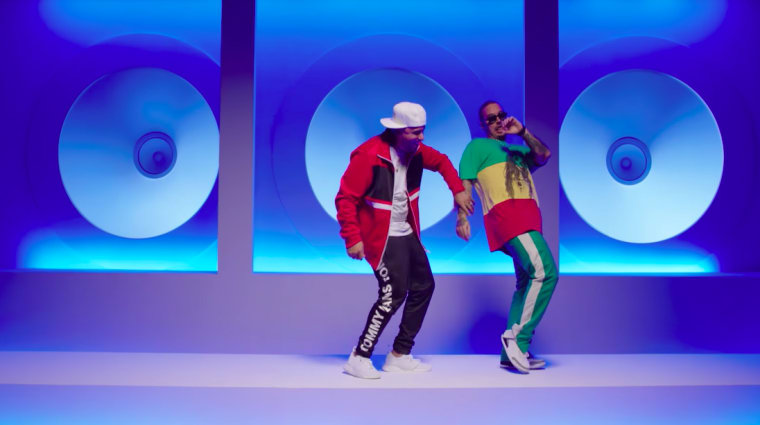 Sony Music Latin
Sony Music Latin
Throughout this season, we've been tracking the race for the Song of the Summer on our podcast FADER Explains. In this episode, we focus on some of the artists leading one of the most important cultural changes in pop music history. Artists like J Balvin, Nicky Jam, and Karol G have some of the biggest Songs of the Summer out right now. NYC's DJ Bembona joins us to break down how the Latinx underground scene is influencing the world.
Subscribe, rate, and review FADER Explains on Apple Podcasts and listen below. Stay tuned for more throughout the summer.
Olivia: So, we've spent this podcast talking about what the song of the summer is and how every genre has one. There's one for country, there's a pop one, there's a hip hop one. What are you seeing as the Latinx pop song of the summer?
Bembona: Wow, that's so difficult to say, just because we have so many genres, which is the most beautiful thing about being Latina in this Latinx mainstream scene, is that we do have-- I mean, reggaeton and trap and hip hop are the ones that are really blowing up right now, and that all has to do with the underground, which I give all credit to for what the mainstream is right now. Culture is going on in the Caribbean and taking it back to the beginning, Africa, everything is African rhythm at the end of the day. And that's something that mainstream music world wants to profit on, so they see their chance and they're like Woo! We had that moment before in the early 2000s. They called it the Latin wave: J.Lo, and Mark Anthony, and Enrique Iglesias, and all these people. I think now what's cool is that a lot of the younger generation in Latinx are not necessarily born elsewhere, they're born right here in America, tying the gap between generations. The influences living here as immigrants, or first-second generation, which is beautiful.
To sum it all up, for me, we did talk about “Te Boté” a little bit? (laughs)
Olivia: Yeah, we emailed about “Te Boté.”
Bembona: Yeah, I mean, I play that all the time. Just because, for me, I see it more as not only to that ex-lover of yours, but also to bad vibes and the bad people in your life. “Te Boté” means "I threw you out" like "I get rid of you now", and I see it as a spiritual thing. That's my translation for the summer, I would love that as my positive vibes. For me, when I think of summer, I think of El Alfa, I think of Dembow, the Dominican wave of artists that are coming out. They're the party. They've been in the forefront of music for a long time. They're the ones that started Latin trap, and hip hop, and baile funk, and all of these things that were coming elsewhere, but now are taking another stage with other artists.
Myles: You mentioned playing “Te Boté” all the time. What are some other songs you've been in constant rotation all summer for you?
Bembona: Oof. For me, personally as an Afro-Latina, I love to play a lot of Afrobeats, too. It doesn't really stick to Spanish language for me. It could range from hip hop, R&B, Afrobeats, dance song, Reggaeton of course. I'm trying to think off the top of my head real quick what's one I really always play. I play “F TRUMP” a lot from TT The Artist and Mighty Mark. Spanish language, I play a lot of Bad Bunny of course. He's like-
Myles: Oh, yeah.
Bembona: He's the wave right now, I love him to death. J Balvin, of course, is another one. Oof. In terms of women, I play a lot of Dominican artists that are coming out that are doing dembow and hip- hop as well, they go really hard. You have Amara La Negra, she’s been killing it for a while. Obviously Bad Bunny's on another level, J Balvin. But then I also think of the underground artists that not necessarily have hits on the chart, El Alfa's been around for a long ass time, but he's not going to be up in the Grammy's, you know? But everybody in the underground and in the streets know about him. People that know about other artists, that don't really get that shine that they deserve in that sense, but they're famous as hell.
Olivia: You were talking about the current political climate. When you're DJing, how much are you thinking about that? How much are you thinking about your space and the, for lack of a better term, categories that you fit into? Do you find that radical at all?
Bembona: For sure. As I've been developing as a DJ and an artist, it's been really important for me to address issues and just be there for my community in any sense of the way. Sometimes people just need a space to riot, and in that way I think movement is really powerful. Music is always forever going to be for me the leading force in art that pushes movements and sociopolitical ideas. Whether it’s “Te Boté” which has its problematic issues, you know, you look at the cover there's a woman in the garbage, but nobody sees that. Taking away those machista or the toxic masculinity of these artists, and translating what applies to us and our real lives, I think is really dope.
For me, sometimes I can say a direct thing with a track that says something, or just holding space is enough for people to let go and be in the moment, be within each other, and just enjoy that freedom. Because that's what it is when you're dancing in a night. It's free. It's freeing.
Myles: What are some other themes in the music that you're playing constantly that really is just popping off right now? That's really exploding? Other than political nature, which is hugely important.
Bembona: I think the underground is always tying those two worlds together a lot. Also, I would say the mainstream obviously is looking at the underground consistently, and stealing and taking and "Yeah, let's see what we could do with that!" So, that's always kind of been there already. I think for me, rhythm is always a big deal. I love moving my body, I love winding. People love to twerk, people like to vogue, and et cetera. I feel like it's taking it back to our roots and just feeling the music out. You throw the drums on and people are already coming back to where they come from. It's just crazy for me. I love Afrobeats for that reason as well, just because how they kind of made it into pop music. Utilizing these instruments and these rhythm percussions into something that's larger than life now. I always love Spanish language hip-hop, I loved it for the longest even before it was out for real. Latinos, Latinx folk have always been a part of the beginning of hip-hop, and that's something people forget. It wasn't only African-Americans, but it was a whole community of folks that were all living in the same neighborhoods and interacting with one another. Things that sometimes, I'm not gonna say that we lack today because there is there, but everything is so categorized and segmented that it's not allowing us to be like, "F all of that, let's just get together and screw these groupings and categories." Rhythm, if this is a question of rhythm for me, is important.
Olivia: And we've talked about this a little so far, but I wanted to ask about what you think of the sudden boom in the zeitgeist about Latin trap? About how Bad Bunny is huge, how Ozuna is huge, and I know this music has always been around but suddenly it's like, “Oh, there's a Spotify playlist for it.” And “Oh, suddenly people who don't speak any Spanish are blasting Bad Bunny from their cars.” Or how do you think that happened? Do you think it's another pendulum swing to that Jennifer Lopez, Mark Antony thing?
Bembona: It definitely is a recycle of that era. And everything I'm about to say is not to discredit the artists that are out right now, because I'm a big fan, too! I love them. I love going to their concerts and listening to them. But I do feel like it's also a race thing, of course it's always been. Back in the Latin boom in the 2000s, there wasn't really anybody that I could identify that looked like me. And I think that's still really relevant today? With the exception of Ozuna, obviously he's Afro-Latino, I don't know if he claims it like that, but it’s obvious that he's black. (laughs) And that's beautiful, but I think that there's still not enough of that. I feel personally, for me, the Latino mainstream is way behind regular pop music, hip hop, et cetera. In terms of race and in terms of sexuality as well. There's a lot of themes that are still not being addressed that they're falling behind. But I do feel that the reason it's blown up right now to what it is today is because they're highly marketable. You look at Bad Bunny, it's like, who doesn't want to market him or pick him up? Because-
Olivia: Because he's the most beautiful. He's so handsome.
Bembona: He paints his nails now, he's beautiful. But besides that, it's more than just music now. We live in a social media era where everyone wants to know about your personal life. And J Balvin is one that, he overshares. He puts everything on Instagram and people love that! They want to connect to you in a way that's more than just the music and I feel like that's a big thing today, that kind of transcends any kind of language barrier because of the look. You see somebody, you're going to get sold ... what's this package, what's your lifestyle, how do they dress, are they cool, can I hang out with them? Which has always been around, you know, but now that everything is so visible and we social media, it's real prevalent. It's bigger.
Olivia: I will cop to, I don't speak Spanish, but I have liked several Maluma thirst traps.
Myles: That's both of us actually.
Bembona: Oh my god, yeah, so I feel like- and also, in the term of white America, or Americans that are non-Spanish speaking, it's easy to put these artists in a box that's comfortable, that can translate to the pop mainstream of today. If you look at a Maluma, he could be compared to your Justin Bieber. Ooh, he's like a suave papi chulo. He's a Latin lover. You know, these horrible connotations of folks that parallel in the American mainstream pop music, English speaking.
I feel like that's a big thing, too! Where it's kind of like, what's easy for us to market? And I owe it all up to the little surge of “Despacito” and all of that because, unfortunately, these songs are what attracted white Americans and non-Spanish speaking folk to be like, Wow! I learned a few words! and This is so exotic! So, I think the exotifying nature of the sudden surge of Latin pop is kind of problematic to me, but that's the reason why it's so big, is because everyone wants to go to Puerto Rico. They want to go on the islands, or go to Colombia, and like, I want to shake my shoulders and try to fit in!
I think that's the only problem I would say about popular Latin artists of today is, not saying selling short of our culture, but playing it safe, I guess. Enough to be able to be popularized and get that fame that they want. I'm not saying that they don't put in the work, or they're not putting in their heart, because there are a lot of tracks where they speak about real issues or just their real everyday life, but there could be a lot more done just to change the perspective of who we are as Latinx folk. Not that we're one-dimensional. We're just a spectrum of people that probably y'all don't even know or can imagine the diversity within our communities.
Myles: A lot of the stars that we've seen take that mainstream pedestal, I'd say 90% of them have been men. Is there a Latinx woman you see approaching that avenue or is that even a lane that makes sense for anyone involved?
Bembona: There's a few things I'm about to say. So, definitely there are, for no doubt. There's a whole surge of women that are coming up in the pop mainstream and there's also always been the underground. If we think about pop pop, like Reggaeton and in that lane, there's the Karol Gs, and Amara La Negra is a big one too right now. Especially because she's been the face of Afro-Latinidad right here in the currency of making it a bigger, shining more light over what it is. The identity and the issues that brings with it, like what we've been dealing with for a while.
The Latino world has always been very machista, very masculine since I was a kid. I go through my home library and I'm looking and I'm like, "Ooh, who do I play?" For example, salsa, 'cause that's one of my other favorite genres of all time. If we think about pop, La India was kind of one of the only woman that was doing salsa, even after Celia Cruz passed away. Everybody kind of links Afro-Latinidad and salsa to Celia Cruz, right, because she was a big icon, but there were so many other people and women doing it. Like La Lupe and all these other folks that unfortunately never got that chance to be in that pop mainstream. Or maybe they didn't even care. Some people just don't want that, and that's respectable too. Not everybody wants that. They want to be loved within their community and that's sufficient enough.
Because everybody knows these people, it's a metaphor of affiliation as an immigrant or first-second generation of "How do we fit in with this place that we now call home?" Or that is home for our family, or maybe not even home. So it's kind of being in between those two worlds of where we come from, and where we're living or where we were born. I don't know if that answers the question. (laughs)
Myles: I think that context is really valuable.
Bembona: If I play English-speaking music, it's really fast to play women artists. But when it comes to Latinx genres of music, you really have to do more research. And this is another time to shout out all my woman artists, Latinas out there, Latinx folk, please hit me up! I want to work with y'all, I want to play your music. Just to put that in there. But it's difficult. There's the Latina pop princesses, or they call them the reinas, but they only are the queen for their male groups, right? There has to only be that one, and she's the first lady, but there can't be others. So that's just things to bring up that are problematic that I feel that needs to be changed.


